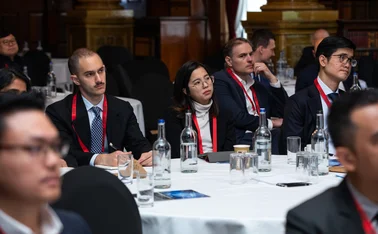
AIIB chief on China's outbound investment development and challenges
China ranked as the world number three in outbound overseas investment in 2012

Statistics indicate that Chinese outbound overseas investment has been on the rise over the past few years, with China ranked as the world number three in 2012. Moreover, out of all the emerging market economies, Chinese overseas investment accounts for 77%. In 2013, the total outbound investment stood at $107.9 billion, up by 22.8% year on year. In the same year, foreign direct investment in China was $123.9 billion, just $16 billion more than the outbound figure. In 2014, China became a net capital exporter.
Some academics indicate that when the per-head income of a country reaches $4,750, the country becomes a net exporter of capital, rather than an importer. The number is too exact to be credible, but when income hits around $5,000 a head, the country might have to think about exporting capital for its investment. One way or another, China's economy is undertaking an important development towards outbound investment with a likely huge impact on the rest of the world. Chinese investment is now more widely distributed across the world, with investors most interested in leasing, commerce and other business services, finance, mining, retail, wholesale, and some manufacturing related to mining. If overseas investments continue to increase, more sectors will be covered.
M&A on the rise
The size of mergers and acquisitions (M&A) has increased. The acquisition by China National Offshore Oil Corporation (CNOOC) of Canadian oil and gas firm Nexen in 2014 via a $15.1 billion deal, was a significant event. Even though this kind of contract may not occur again in the near term, there is strong possibility that it could be repeated in the future. Overall, the size of the M&A can be expected to increase.
Another noticeable feature is that local companies, rather than central companies, have increased their investment overseas, and non-state-owned private companies are increasing their foreign investment.
Chinese investment has contributed substantially to the development of the host countries. The positive impact on local economies and local communities has been appreciated by more and more people. The geographical distribution can be rather misleading. Chinese investment in Asia seems to be decreasing proportionately during recent years, but this is not because Chinese investors are losing interest in Asia, it is more due to China's investment being expanded to cover other regions of the world.
Hong Kong's role
Another factor is the role of Hong Kong. Even though Hong Kong's role as China's gateway to the outside world is not as big as 20-30 years ago because China is now opening up widely, it is still very much an important one. Many companies like to have their subsidiaries set up in Hong Kong as stepping stone to reaching out to the rest of the world.
With regard to Europe, China has maintained very strong business ties with European countries, particularly at a time when eurozone countries experienced tremendous difficulties. Some European countries appreciated China's general support when they were in a very difficult situation. In general, European countries warmly embrace Chinese investment, but there are some concerns with regard to Chinese-European economic ties. Sometimes there are noises from countries that seem to be very good friends with China. This kind of political sentiment could create problems, particularly if the nations are major destinations for China's overseas investment. Why should China consider pouring money into a country that seems to be hostile to it? Even if this does not represent the mainstream sentiment, and does not represent the official position of the countries, it is a little bit worrying.
Post-2008 picture
Ever since the 2008 financial crisis, many Chinese companies have been keen to increase their investment in European countries. In 2010, direct investment in the EU was €6.1 billion. By 2012, China's direct investment increased to €27 billion. The difficulties experienced by European countries appeared to provide Chinese companies with a great opportunity. Chinese manufacturer Shandong Heavy Industry Group purchased 75% of the Italian shipbuilding company Ferretti, manufacturer Sany Heavy Industry purchased German machinery fabricator Putzmeister, and the Chinese state energy grid company purchased the Portuguese state grid. It would be advisable for European countries to take more proactive steps geared towards investment from China, which provides opportunities for both Chinese and European companies.
Discrimination against investment from China is not wise. (Preferential trade agreements and other multilateral trade negotiations that do not include China create global cross-border investment distortions.) For instance, there are some non-EU countries that have reached trade agreements or can carry out transactions with EU members so that their countries can enjoy the privilege of access to the market, approximating the status of EU members. In this regard, China seems to be a lonely outsider, with Russia in a similar position. The exclusion of China is, in fact, detrimental to the European countries themselves. China is made conspicuous as an outsider by its huge amount of capital flow to Europe. This should be acknowledged as abnormal.
Europe and the US
Some politicians - and even the general public - have an ambivalence towards Chinese investment, which has been fuelled by the media. The media try to make sensational news about Chinese investors, exaggerating the negative impact on the local economy to a certain degree that leads the public sentiment to be a bit unfriendly towards Chinese investors.
I was once interviewed by a correspondent from the German newspaper Die Welt, who asked me: "Mr Jin, do you think that China would buy out the whole of Europe?" I said: "Thank you very much for your compliment. It's impossible for us to do that."
And the rhetoric of the ‘China threat' has been amplified for the general population, which is a huge problem. It is worrying that there are appeals in some European countries, where they should have a unified investment review policy, to censor investment applications from China.
China has traditionally chosen the US as its main investment destination and China Investment Corporation (CIC) has poured significant amount of capital into the US for many years. The US has usually been a trusted destination country, based on its adherence to the rule of law as well as its political and economic stability. Nowadays, we have more and more returns from Wall Street firms and some of the well-known big US companies. It is therefore natural that Chinese investment in the US would increase, given this win-win situation. However, China has been experiencing similar difficulties of discrimination in the US and always hopes that the Committee on Foreign Investment in the United States (CFIUS) will not create any excuses to block China's investment to the US.
Private investment and responsibility
Meanwhile, China's non-state, private-sector investors are increasing their investment in the rest of the world. When they do so, they should obey the laws and rules of the country they are investing in, be aware of and respect the religions and local customs, protect the environment and the interests of local people. When a major project occurs, the investor should also contribute to the local community in terms of development, charity, education and health. The investor should try to create a harmonious relationship with the local community, so that people in Africa, Asia and Latin America could start to sense that Chinese investors care, not only for their own profit, but also for the mutual benefits arising from their investments.
Only users who have a paid subscription or are part of a corporate subscription are able to print or copy content.
To access these options, along with all other subscription benefits, please contact info@centralbanking.com or view our subscription options here: http://subscriptions.centralbanking.com/subscribe
You are currently unable to print this content. Please contact info@centralbanking.com to find out more.
You are currently unable to copy this content. Please contact info@centralbanking.com to find out more.
Copyright Infopro Digital Limited. All rights reserved.
As outlined in our terms and conditions, https://www.infopro-digital.com/terms-and-conditions/subscriptions/ (point 2.4), printing is limited to a single copy.
If you would like to purchase additional rights please email info@centralbanking.com
Copyright Infopro Digital Limited. All rights reserved.
You may share this content using our article tools. As outlined in our terms and conditions, https://www.infopro-digital.com/terms-and-conditions/subscriptions/ (clause 2.4), an Authorised User may only make one copy of the materials for their own personal use. You must also comply with the restrictions in clause 2.5.
If you would like to purchase additional rights please email info@centralbanking.com








